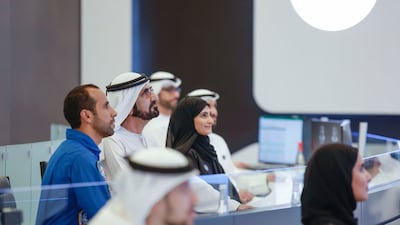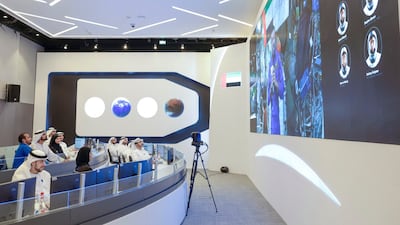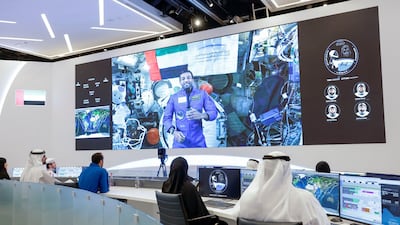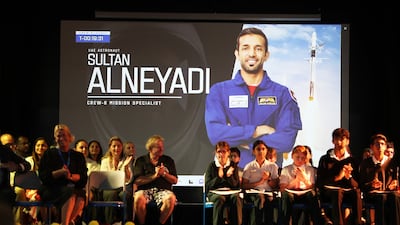Emirati astronaut Sultan Al Neyadi has phoned home after settling in on the International Space Station.
He spoke to Sheikh Mohammed bin Rashid, Vice President and Ruler of Dubai, on Tuesday, in a conversation that was broadcast through a live video link-up on Nasa TV.
After a quick check of the equipment, Dr Al Neyadi smiled at the camera as Sheikh Mohammed spoke to him from the Mohammed bin Rashid Space Centre in Dubai.
“We are thankful you have reached the International Space Station and thank God for your safety,” Sheikh Mohammed said.
“I would like to let you know that the youth of the UAE and the Arab world are taking you as an example and wish you all the luck.”
“Thank you, Your Highness,” said Dr Al Neyadi.
“Hopefully people will follow in the footsteps of my brother (Hazza Al Mansouri) and mine. This is what we hoped for.”
Sheikh Mohammed asked the astronaut what kinds of experiments he and the team would be performing on the ISS.
“We have a very crowded schedule. Today or in three days time a crew will leave the ISS and our crew will handle all of the tasks and throughout the coming six months we will conduct scientific experiments,” said Dr Al Neyadi.
“We have a large number of scientific experiments that the UAE will take part in, in addition to international agencies.
“One of the scientific experiments is us, Your Highness. Astronauts in microgravity are also subjects of experiments. One day people will go to the Moon and Mars. We have to understand the effects of microgravity on our bodies.
“This is one of the experiments that we conduct on a daily basis. We monitor the impact and the effects of space on our bodies so we can avoid this in the future.”
When asked if he was used to the ISS, he replied he was getting more acclimatised every day, but that mascot Suhail was better at coping with microgravity.
Maj Al Mansouri, the UAE's first astronaut, was also present with the Dubai Ruler. He was asked what it was like to return to Earth after being in space.
“Yes, Your Highness, it is one of the difficult things. You need up to two weeks to get used to walking again,” Maj Al Mansouri said.
Maj Al Mansouri also emphasised that they can monitor Dr Al Neyadi's position and see when he is passing over the UAE.
“We have all these cameras outside the ISS, our colleagues are all here monitoring Dr Sultan,” Maj Al Mansouri said. “We have a whole crew whose main mission is to follow Dr Sultan and monitor his mission.”
After the event, Sheikh Mohammed tweeted to say Dr Al Neyadi was part of the UAE's bright future.
"During my conversation today with Sultan Al Neyadi, the first Arab astronaut on a 6-month long mission on the International Space Station, Sultan opens new doors for our youth, raises the ceiling for the aspirations of our generations, and represents a bright part of our future."
Dr Al Neyadi, 41, has been aboard the ISS for four days and will spend six months in Earth's orbit.
During his time there, he will take part in more than 200 experiments assigned by Nasa and 19 others involving UAE universities.
Live streams and pre-recorded videos will be broadcast each week to hundreds of schools in the country, in which Dr Al Neyadi will share what life in space is like.
The talks are part of a new educational project by the Mohammed bin Rashid Space Centre and the Emirates Literature Foundation.
Dr Neyadi is the second Emirati to travel into space ― after Maj Al Mansouri's eight-day stay on the ISS in 2019 — and the first Arab to undertake a long-duration mission. He could also possibly perform the first spacewalk by an Arab astronaut.




